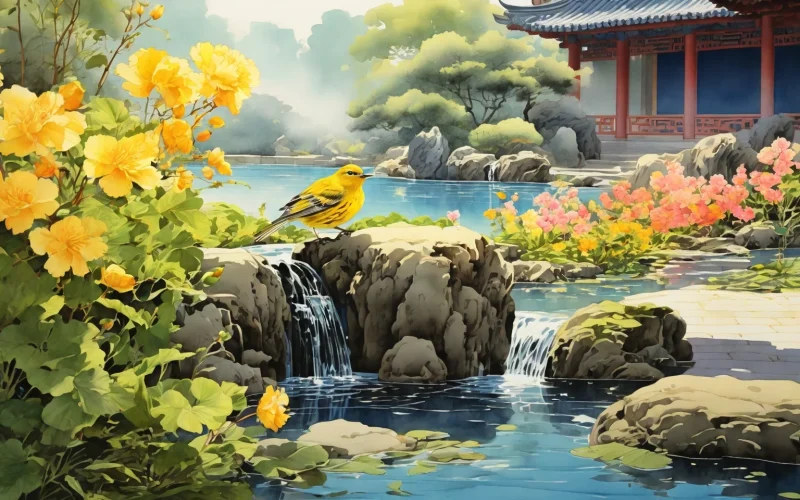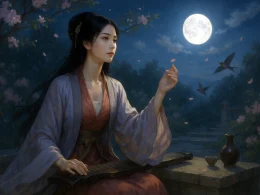Orioles sing midst iris-green,
Dawn welcomes trysts with loves unseen.
By woods and pools, words fade away—
Where mandarin ducks preen wings at play.
Spring-warmed springs nurse healing herbs,
Sunlit hours stretch blooms’ slow verbs.
This meeting begs unmeasured wine—
Such perfect hours won’t realign.
Original Poem
「题萧丞小池」
钱起
莺鸣蕙草绿,朝与情人期。
林沼忘言处,鸳鸿养翮时。
春泉滋药暖,晴日度花迟。
此会无辞醉,良辰难再追。
Interpretation
This poem was composed by Qian Qi during the High Tang period as an inscription for a small pond in the residence of his friend Xiao Cheng, a local official and literary connoisseur. Through describing the scenery of a friend's dwelling, the poet expresses the joy of reunion and his lingering attachment to spring's beauty. Set against a morning pondscape in springtime, the verses weave friendship, nature, and life's reflections into a tapestry that is both vivid with daily charm and tinged with wistfulness for fleeting moments.
First Couplet: "莺鸣蕙草绿,朝与情人期。"
Yīng míng huì cǎo lǜ, zhāo yǔ qíng rén qī.
Orioles sing through emerald irises—
At dawn I keep tryst with a kindred soul.
The opening couplet unfolds a fresh spring tableau with "orioles" and "irises," while "kindred soul" (情人, here meaning "bosom friend" rather than romantic lover) establishes the visit's purpose—a heartfelt meeting between confidants.
Second Couplet: "林沼忘言处,鸳鸿养翮时。"
Lín zhǎo wàng yán chù, yuān hóng yǎng hé shí.
By woods and pools, words grow unnecessary;
Here mandarin ducks and wild geese preen their wings.
Transitioning to the tranquil setting, the couplet depicts a silence beyond speech, where humans and waterfowl coexist harmoniously. "Preening wings" symbolizes both natural harmony and the cultivation of inner refinement—quietude breeding depth.
Third Couplet: "春泉滋药暖,晴日度花迟。"
Chūn quán zī yào nuǎn, qíng rì dù huā chí.
Spring-warmed waters nourish medicinal herbs;
Sunlight lingers slow through flower lattices.
Continuing the spring vignette, "lingers slow" (度花迟) masterfully captures sunlight's leisurely passage through blossoms, metaphorically extending the desire to prolong this idyllic hour. The imagery radiates serenity and suspended time.
Fourth Couplet: "此会无辞醉,良辰难再追。"
Cǐ huì wú cí zuì, liáng chén nán zài zhuī.
For this gathering, drunkenness finds no demur—
Such golden hours refuse to be reclaimed.
The finale voices carpe diem urgency. "No demur to drunkenness" reflects unfettered camaraderie and poetic abandon, while "golden hours unclaimed" elevates the scene into a meditation on transience—infusing serene beauty with poignant impermanence.
Holistic Appreciation
This poem is a masterpiece that weaves together friendship, nature, and philosophical reflection. Through the depiction of a small springtime courtyard pond, it captures the warmth of a gathering between the poet and his dearest friend, while also conveying a sense of longing—both for the fleeting season and the preciousness of such meetings. The term "kindred spirit" (情人) here refers to a soulmate, embodying profound camaraderie; phrases like "swans grooming wings" (鸳鸿养翮) and "spring waters nourishing herbs" (春泉滋药) artfully blend the leisurely life of reclusion with the rhythms of nature. The poem cherishes real-life friendship while lamenting the passage of time, inviting readers to both admire the scenery and be moved by its emotional depth.
Artistic Merits
- Emotion Woven into Scenery: The spring landscape mirrors the harmony between friends—feelings arise from the scene, and the scene is animated by emotion.
- Subtle Language, Layered Meaning: The diction is fresh and understated, unfolding naturally from the rendezvous to the setting and finally to contemplation, with a seamless yet deliberate structure.
- Natural Allusions, Rich Imagery: "Swans grooming wings" implies noble aspirations, while "spring waters nourishing herbs" reflects an idealized life of retreat.
- Resonant Closing Line: The poignant "such fine hours are hard to recapture" (良辰难再追) underscores life’s unpredictable partings, adding a philosophical layer to this otherwise serene work.
Insights
Titled "Inscription for the Pond," this poem uses scenery to express deep emotion, employing spring’s transient beauty as a metaphor for life’s brevity. It reminds us to cherish present moments and friendships, to not squander precious time, while also embodying a restrained yet gentle outlook—finding solace in nature and wisdom in companionship. More than just writing verses by a pond, the poet and his friend share a meditative appreciation of time, embodying a life rich in aesthetic and philosophical depth.
About the Poet
Qian Qi (钱起, c. 722-780), a native of Huzhou, Zhejiang, was the foremost of the "Ten Talents of the Dali Era" in mid-Tang poetry. His poetic style, inheriting Wang Wei's legacy, excelled particularly in regulated verse (五律), characterized by its ethereal elegance. Yan Yu praised his work as "innovative in form," reflecting the Dali period's transition from the High Tang's naturalism to refined craftsmanship.











